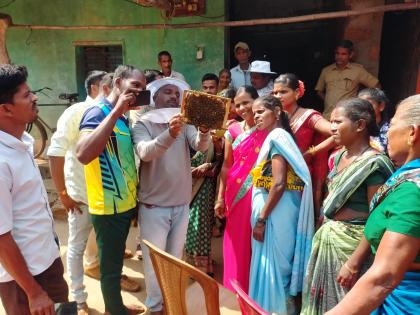How the Honey Revolution is Transforming the Lives of Karnataka's Tribals
By Anubha Jain | Updated: July 17, 2024 13:03 IST2024-07-17T13:02:38+5:302024-07-17T13:03:48+5:30
With the vision to empower the tribal communities, encourage rural tribal tourism, and garner community participation in Forest-Wildlife Conservation ...

How the Honey Revolution is Transforming the Lives of Karnataka's Tribals
With the vision to empower the tribal communities, encourage rural tribal tourism, and garner community participation in Forest-Wildlife Conservation efforts, the forest department of Karnataka is honing tribals' skills, offering them tech assistance, providing a marketing platform, and converting the scenario into an enriching source of livelihood for the forest dwellers. To promote this vision SWAYAM-ENEC (Saving Wildlife in Association with Young Aspiring Minds-Eco-development and Nature Education Center) has been formed at Kumbharwada with the support of Dandeli Anashi Tiger Reserve Foundation in 2023 for developing and implementing Eco-development and Nature Education models in the Kanara (Central Western Ghats) landscape. This initiative is led by Nilesh Shinde, IFS, Deputy Conservator of Forests and Director Kali Tiger Reserve, Dandeli.
Lokmat representative Dr. Anubha Jain in an exclusive interview with Nilesh Shinde talked about ‘Swayam’ and Nilesh Shinde explained, “Swayam is created for imparting training to youngsters in apiaries and tech exposure to harvest and produce quality honey. In the forest dwellers community of Kali Tiger Reserve, SWAYAM has inspired a scientific beekeeping model to provide them with a supplementary source of income; village coir industry in the said center promotes microfinancing, a better livelihood option to local women tribals and encourages women empowerment. With the training of Dutch Coir Mat making, over 15 women have trained so far. SWAYAM extends continuous support for dry waste management to Gram Panchayat, Kateli in Joida taluk. This unit scientifically maintains a plastic-free environment in the reserve area of Kumbarwada and avoids adverse impacts on wildlife from dry waste. The center runs other programs to uphold the ethos of Community-based Conservation including supporting academic online education in Government-run school children.”
For several years tribes like Jenu Kurubas, Soligas, Kunabis were harvesting honey in the forest through their traditional practices. However, to make these tribal communities self-reliant the forest department is enhancing their traditional skills by merging with modern scientific know-how, and technical support by the forest department and experts. Adavi Jhenkara Programme has started to impart scientific beekeeping knowledge to the local forest dwellers for an additional source of income. This project is operationalized in 7 phases and has already completed three phases. These phases have been concentrating on women's empowerment, quality supply of bee colonies and bee boxes, providing a proper marketing platform, maintaining a high quality of honey, following quality-control tests, certification processes, and also encouraging apiculture eco-development research including Api-tourism. In the first phase (2023-24) 60 beneficiaries with the distribution of 70 free bee-hive boxes of Apis Cerena have collected at least 10 kg of organic honey from the hive box in the past one year. A dedicated honey processing center will also be set up by next month in August to process honey and bottle it scientifically.
The establishment of SWAYAM marks a turning point in Kali Tiger Reserve’s eco-development narrative with a vision to test-run eco-development models before scaling. Through SWAYAM around 350 forest dwellers' families have been educated. Over the last one year, 250 youngsters have been trained and each individual produces 50 kg. of honey annually. The department transfers the profit of honey sales to the tribals. Likewise, in Bandipur and Nagarhole Tiger Reserves, the department has distributed bee boxes and the honey procured is being sold through the Large Area Multi-Purpose (LAMP) Society.
In Biligiri Ranga Temple (BRT) Tiger Reserve, Soligas tribals have developed a cooperative society and obtained a license under Forest Rights Act. In BRT Tiger Reserve, small quantities are being sold by Jainu Kurubas through the LAMP Society and the National Rural Livelihood Mission. Madegowda, President of Sri Biligiri Rangaswamy Soligara Samskarana Sangha said that 2000 members have been trained in beekeeping and they have provided financial aid to start production. The harvested honey is marketed through society and profits are transferred to beekeepers in the form of dividends. He said that this honey is accredited and sold online also. Yearly 20 tonnes of rock bee honey is produced at the reserve and 3-4 tonnes of honey is produced by Apis Cerana bee with 2000 kg of apis florea honey.
Forest officials of all five tiger reserves, using the Project Tiger funds, are helping forest dwellers with bee boxes and technical support to make them financially independent. Dr. Ramesh Kumar P., IFS and Conservator of Forests (Project Tiger) Mysuru said, “After Kali Tiger Reserve this initiative will be started in all tiger reserves of Karnataka.”
Open in app